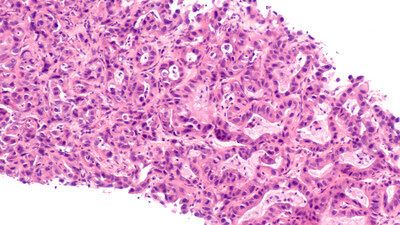New Avenue for Treating Pancreatic Cancer Discovered by Kansas City University Researchers
 Kansas City University (KCU) Associate professor Ehab Sarsour, MSc, PhD, and student-researchers have discovered a new and promising avenue for treating pancreatic cancer. Katiana Hebbert, a third-year medical student and research fellow repurposed Acipimox, an FDA-approved drug by Pfizer used to treat hyperlipidemia to target the environment around the cancer before using radiation and chemotherapy.
Kansas City University (KCU) Associate professor Ehab Sarsour, MSc, PhD, and student-researchers have discovered a new and promising avenue for treating pancreatic cancer. Katiana Hebbert, a third-year medical student and research fellow repurposed Acipimox, an FDA-approved drug by Pfizer used to treat hyperlipidemia to target the environment around the cancer before using radiation and chemotherapy.
The discovery builds on research published by Dr Sarsour in 2020 in the Journal of Biological Chemistry, and a recent published abstract in the journal of Free Radical Biology and Medicine. The research found that pancreatic cancer cells receive support from fatty acids that feed pancreatic cancer tumors and protect them from radiation and chemotherapy. As humans age, the risk of cancer increases due to metabolic change dependent on fatty acids and lipids Fatty acids help pancreatic tumor cells resist radiation and chemotherapy.
"Katiana' s research work resulted in making cancer cells weaker, depriving them of nourishment from the microenvironment they were in that enables them to be resilient," said Sarsour.
Equally significant, Hebbert noted, the drug was able to stop the growth of the cancer by lowering the levels of fatty acids both inside and outside the cells surrounding the cancer cells. Hebbert added that "We were able to impact one of the most important parts of the cancer cells growth by blocking their ability to replicate." Hebbert said. "We were thrilled to be able to halt cancer cells proliferation by activating a metabolic checkpoint which prevents cancer cells from replicating their DNA to be able to divide and reproduce. This missing checkpoint is a major reason why cancer cells do not stop dividing and progress"
An added benefit, the weaker the cancer cells are, the less chemotherapy and radiation may be needed for a patient to see results. "If this can help radiation and chemo perform better and limit normal cell toxicity at the same time, that would a great double whammy," Hebbert said.
Hebbert will receive a prestigious award from the International Congress of Radiation Research for her work, which ICRR judges called "groundbreaking." and was chosen for a podium presentation.
She will present the findings of the work amid an international panel of radiation researchers considered to be the best in the field in Montreal August 27-30, 2023.
More research is underway in Dr Sarsour's laboratory at KCU, testing the mechanism of the drug in cells as well as safety. Sarsour is currently applying for research grants that could bring the protocol to clinical trials within three years.
Additionally, Sarsour and his students are collaborating with the University of Iowa, University of California and the pharmaceutical company Loxagen, Inc. in research using an investigational new drug to target defective fibroblast cells within pancreatic tumors.
"My goal here at KCU is to the take the first steps," said Sarsour. "We want to prove the biology of the drugs and that it does what it is supposed to do inside the cell. If we can do that, there will be more hope for those impacted by this deadly disease."